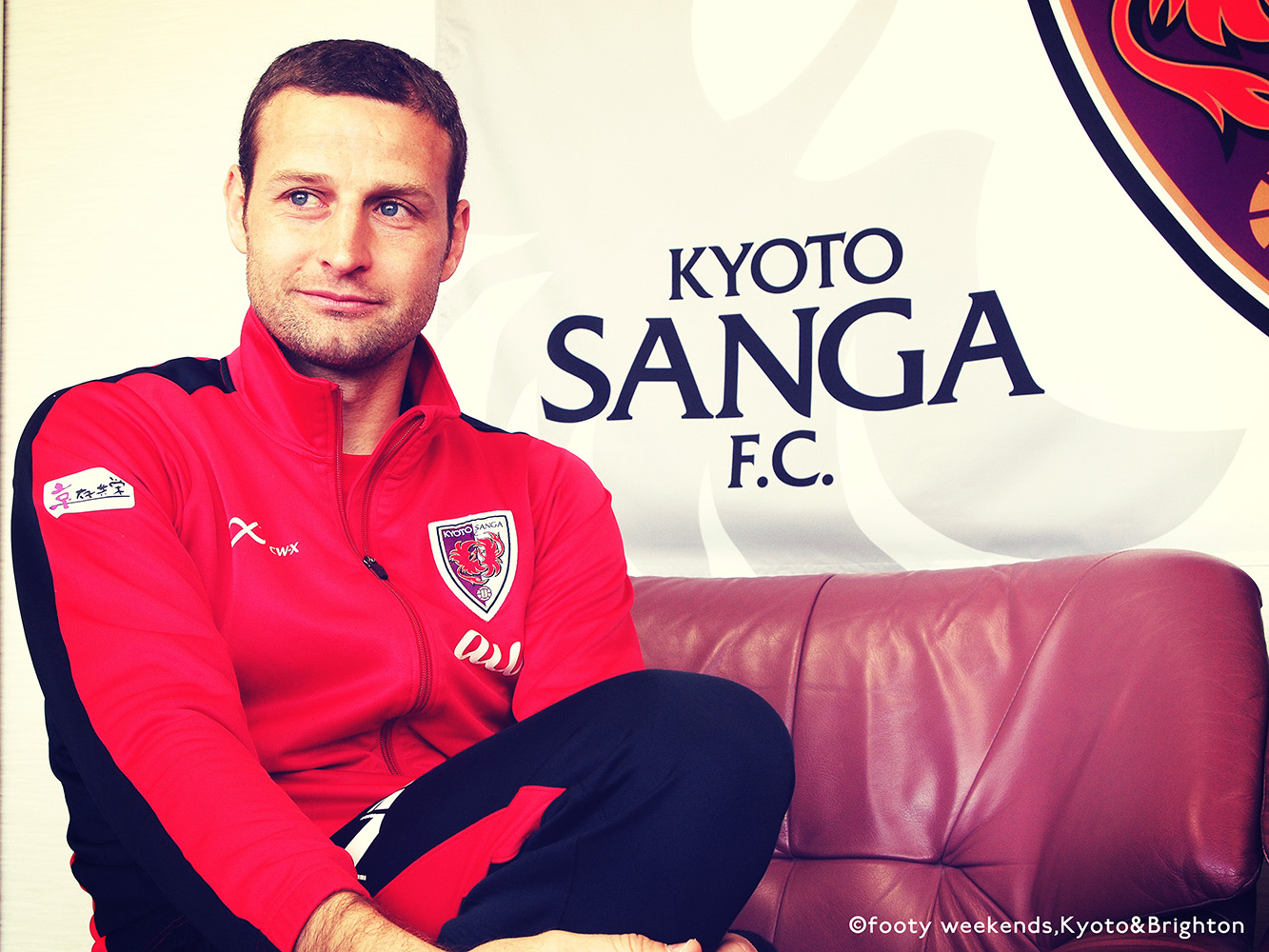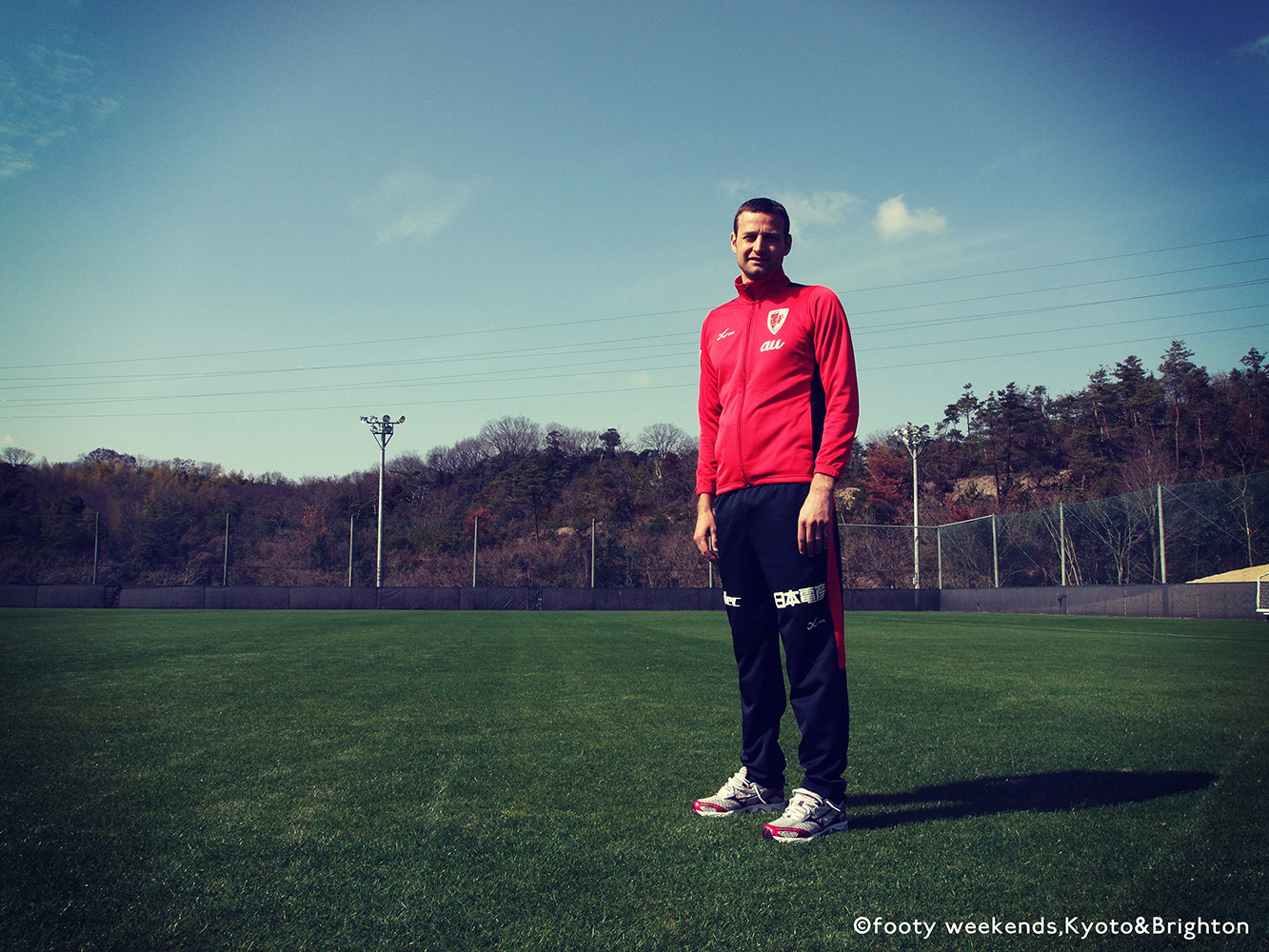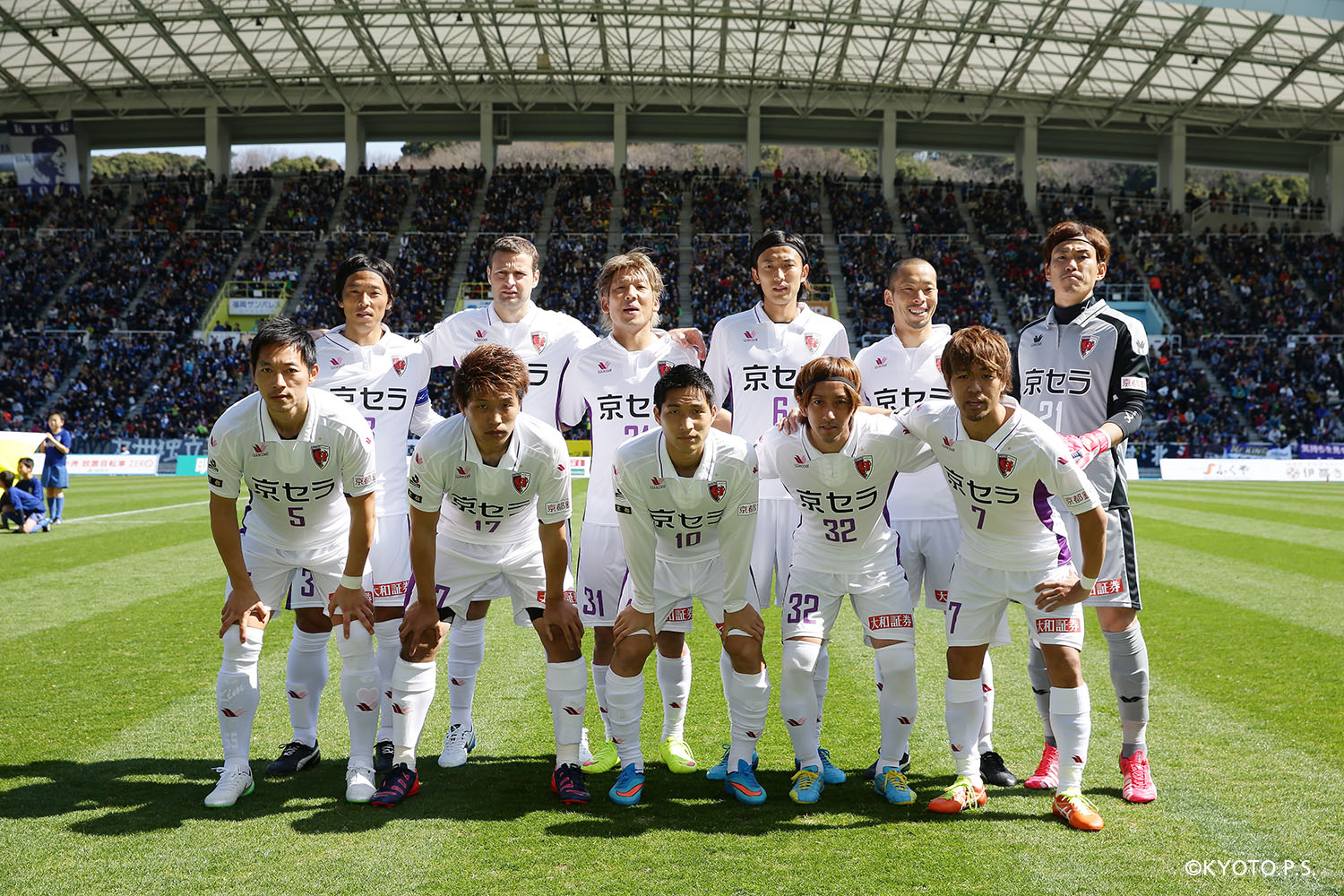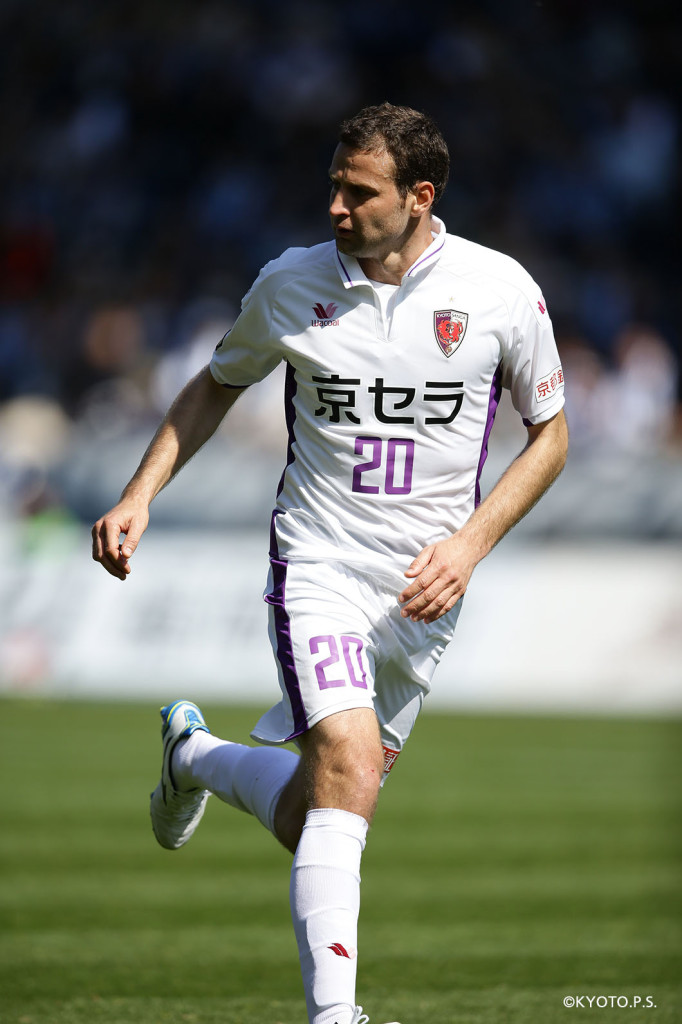Red Star and Nagoya Grampus fame, mentored by Dragan Stojković(Former Nagoya Grampus boss), and now the backbone of J2 club Kyoto Sanga FC’s back line. Serbian born, Milos Bajalica, more fondly and well known as ‘Baki’, has kept his Serbian style of play throughout his long career in Asia. Very rarely does a ball get past him, and he is not afraid to take the ball to the front and flex his shooting skills. On match days, the number 20 maintains a stern and serious exterior, but like a switch, reverts back to his off the pitch laid back cheeky self. He is often seen in training teasing his team mates, and laughing around with the younger fans at team events. How has this popular Serbian player changed during his time in Japan? How does Japanese football live up to his previous career in Europe? And what did he really think about that free kick?!
ドラガン・ストイコビッチ(元名古屋グランパス監督)に師事し、レッドスター・ベオグラードと名古屋グランパスで活躍、現在はJ2の舞台で戦う京都サンガF.C.の守りの要である、セルビア出身のミロシュ・バヤリッツァ選手、通称バキは、アジアでの経験が長いながらも彼特有のセルビアンスタイルを特徴にプレイを見せます。彼がボールを保持するとそれを奪われることは珍しく、そして恐れることなく果敢にボールを前へ運び、チャンスと見るやシュートを放っていきます。試合になると、背番号20の男の表情はとても厳しくシリアスさを保っていますが、一度ピッチを離れるとそれはスイッチが切り替わったかのように、厳しかった表情は笑顔に変わり、トレーニング中や地域の小学校などで行われる地域活動では、チームメイトやファンの子どもたちと頻繁にじゃれ合う姿を見せるといった人懐っこい一面を見せます。この人気者のセルビア人選手は、日本でプレイをする間にどのような変化をしていったのか?彼のヨーロッパでの経験は、どのように日本のフットボールを盛り上げるのか?また、イギリスの各メディアが” CRAZIEST FREE KICK”と呼んだ、あのアウェイ横浜FC戦で石櫃選手がゴールを決めたフリーキックについて、どう思っているのか?などを伺いました。

Holder of the number 20 shirt, an unusually high number for an international player in Japan, where clubs tend to give overseas players the lower numbers. Baki has made that number his own since being given it when he turned professional, and made sure it was his again here, requesting it well in advance of his arrival at Sanga.
During Baki’s time in Japan, he has acted as a kind of ambassador for J League, encouraging people from back home to come over and watch games, and even calling up players to come over and play. Like Piksi (Dragan Stojković), Baki has become a convert to the ways of Japanese football, and believes in its potential to impress hardened European fans and players. “My Serbian friend visited and watched a game. He couldn’t believe it was only second division, as the quality of play was so high, especially compared with the Serbian SuperLiga.” He admits though that it’s hard for any club in the second division to get attention from fans and players, but he wants Sanga to be more well known. “I agree with my friend, but unfortunately not many people in Europe know this, or about J2.” But he is convinced that the new stadium, due to be built within the next 3 years, will be a big game changer for Sanga in their ability to attract fans to the games. “Once the new stadium is built, a new generation will begin, with new opportunities.”
−背番号20
日本では、外国人選手が20番という二桁の背番号を保持しているのは珍しく、海外からやって来る選手に与えられる背番号は一桁のものになる傾向があります。この20という背番号は、バキがプロ選手になって以来付けているもので、彼がサンガにやってきた時もそれをリクエストしたそうです。
−Jリーグをもっと知ってほしい
セルビアに暮らす友人をJリーグの試合観戦のために日本へ誘ったり、友人のサッカー選手をJリーグに呼んでみたりと、バキは日本に滞在している間、Jリーグ大使のようにJリーグの魅力を広く知ってもらうべく活動をしています。ピクシー(ドラガン・ストイコビッチ)のように、バキ自身も、ヨーロッパの熱烈なフットボールファンや選手でも、日本のフットボールに関心を持ってもらい、日本のフットボール通になってもらえる可能性があると考えています。
「セルビアから友達が日本へ(Jリーグの)試合を観戦しに来た時、思っていたより試合が面白く、セルビアのスーパーリーガと比べても選手の技術も高い、これが1部じゃなくて、2部のフットボールということに、彼(友達)は驚いていたよ。」しかし、どこの国でも、2部のフットボールクラブに注目してもらうことは難しいと、バキ自身も認めていますが、それでも彼はサンガをもっと知ってもらいたいと願っています。
「これは友達と同じ意見なんだけど、残念ながらヨーロッパの多くの人間は、Jリーグの質の高さ、またはJ2そのものについてもよく知らないんだよね。」でも、「新しいスタジアムが完成する頃には、今の若い世代が活躍する時代が来るでしょう、その時にはもっともっと(ファンに関心をもってもらう)チャンスが来ると思うよ。」と、3年間後に出来る新しいスタジアム(仮称:京都スタジアム)で、ファンをより増やすことが出来る可能性があることを彼は思っています。

When asked about that free kick, Baki’s face grins. It caused a frenzy in international media, and was described as an incredible, clever, but cheeky free kick. The 6 person line up, with 4 step overs, dummied the wall and keeper perfectly, resulting in the second goal of the game and a win away against Yokohama FC. Surprises like this on the pitch don’t appear to be the Serbian defender’s cup of tea, as he recaps the build up to the moment shrugging his shoulders. He admits that it was a good thing in the end as it delivered a good result, but it’s not something he likes to be a part of. After the game, he received a flood of phone calls and emails from his friends back home in Serbia asking “What was that?”. “They had never seen anything like it in Europe. But after all this time in Asia, I understand that this type of thing happens. But yes, it was a big surprise!” he laughs.
−クレイジー過ぎるフリーキック
インタビューの中で、昨年、海外のメディアでも話題となり、ロンドンやブライトンに暮らす私の地元の友人達も「京都サンガがこっちの新聞に載ってる!」と興奮してメッセージを送ってきたあのフリーキックについてどう思うのか聞くと、バキはそれを思い出し、ふと笑みをこぼしました。
「すごい」「かっこいい」「ずる賢い」など、海外のメディアが一斉に取り上げ、熱狂させたフリーキック。2014年5月6日のアウェイ、横浜FCに、その2つ目のゴールが決まり勝った試合、6人の選手が並んで、4回ステップオーバーをして、ゴール前で壁をつくっていた選手、キーパーを撹乱させて決めたゴール。
私がこのフリーキックがどうだったかを説明している時、バキは笑いながら肩をすぼめ、「結果は良かった、でも自分の場合はそういうことは遠慮するよ。」と、試合中のサプライズはあまり好きじゃないと口にしました。試合後、セルビアにいる友人からは「何だあれ?!」というメールや電話が殺到したそうです。「もちろん、彼らはそういうものをヨーロッパで見たことがないことだったからね。でも、僕は長い間アジアにいるから、そういうことが行われるのはわかるよ。でもやっぱりサプライズだったよね。」とバキは嬉しそうに笑いました。

After 8 years of playing professional football in Asia, with a stint in China between Nagoya and Sanga, Baki fully admits that he has calmed down a lot during his time here. He puts this change down to the good atmosphere of Japanese football. “It is calm here, so I have calmed down.” He describes the atmosphere in Europe as carrying a lot more tension. “Every 2 or 3 weeks there are some problems, a fight. In Europe, sometimes the younger players don’t respect the older players, but in Japan they have to respect them, which is a good thing.”
Like most people who work abroad, Baki has experienced some moments of culture shock as he adjusted to Japanese football, saying that it took quite a few years to get settled and accept how different it was here. “Every year has been difficult. In the first year, I was nervous and worried all the time, everyday, every game. But after 3, 4 years I began to calm down. When I was constantly nervous all the time, I would often get headaches and need to take sleeping tablets. But now I have no stress.” So what was it that caused the stress? “In European clubs, everybody just thinks about the result. Winning. You have to win the game. But in Japan, it is very important not to be negative towards the players. It is not always necessary to win. We play here for support. But in Europe it is only important to win games. Players worry about getting injured, and they give 100% just to win the game. As soon as the game is finished, it’s back to training. If they win, they are happy. But in Japan, if you win or lose, when I look at the players here, they have the same look on their faces. Losing is OK, because this is part of football, and the players still give 100% here.” Baki credits Japanese football players as thinking beyond the money they can get from their club, and their loyalty to the sport. “In Asia, football is like a normal job, a job for life. After their playing career is finished they become coaches or managers, working at the club. But European players often just move around searching for more money.” Baki obviously has great respect for his colleagues here, but says that when he was in Nagoya at first, this ‘calmness’ and way of thinking stressed him out. “Everyone is playing, winning or losing, they are still smiling. But I was unnerved by this, until I accepted that this is the Japanese way.”
“In Serbia, and Europe, everyone is always shouting, picking up water bottles, crushing them with their hand and throwing them down on the floor, the coaches shouting at the players, the players shouting at each other. The supporters, the coaches, the club staff, everyone is always shouting. But in Japan, no one shouts. Once I played in England, and someone fouled me. I showed my pain, and was told to be quiet and get back up. When I had the ball, people were shouting at me telling me I was playing wrong. But in Japan, everyone is calm. It is so different.”
Japan has taught Baki a calmer side of football, and as he has adjusted to the cultural differences within his profession, he seems at ease and content with his life in the J League. There is one thing though that does make him look back to his European football days with fondness. Japanese coaches are often keen to expose their younger players to more hours of training to give them more time with the ball. For experienced players such as Baki though, he feels that European clubs are less intense. “In Europe, training is only about 1 hour maximum most days, but here training is often 2 hours. Too many meetings and training sessions make the players tired. But the new coach is good, not too many meetings or sessions!” He laughs cheekily.
−これが日本のフットボールなんだ
セルビアのクラブで8年間プレイを続けた後にアジアへ渡りグランパスに加入、その後中国のクラブでプレイした期間を挟み、サンガへやって来たバキは、京都でのプレイ、暮らしに完全に馴染んでいる様子を語ってくれました。「日本の整った環境では、安定してプレイに専念出来るし、僕も落ち着いてフットボールが出来るよ。」また、「(ヨーロッパでは)2,3週間ごとになにかしらの問題が起こり、そういった問題との戦いなんだ。あと、ヨーロッパで時々見られるのが、若い選手が経験豊富な選手に対してリスペクトをしないということがあるけど、でも、この日本ではみんなが彼らに敬意を払っていて、それはとてもいいことだよね。」と、彼は、ヨーロッパでは常に緊張した状態がもたらされた雰囲気があることを語りました。
外国で働く多くの人がよく口にするのが、現地の文化を受け入れ、慣れるまでに2,3年はかかるということです。バキも、日本のフットボールに馴染んでいく中で様々な瞬間にカルチャーショックを感じ、「毎年、なにかしら難しいことはありますが、1年目は、毎日、毎試合、終始何かに対して神経質になり心配ばかりしていました。でも、3,4年も経つと、もう慣れたね。以前の、常に神経質な状態が続いていた時には、私はしょっちゅう頭痛に悩まされ、寝るときも睡眠薬が必要な状態だったんだよ。でも今は、ストレスなんて全く無いよ。」ストレスの原因は?と聞くと、「ヨーロッパのクラブでは、みんなが常に結果のことばかりを考えています。それはもちろん勝つことです。おまえはこの試合で勝たなくてはいけないと。でも日本では、選手に求められる重要なことは、そういったことだけではないのだなと。絶対勝利が常に必要であることばかりではないのだなと。私達の存在は、サポーターのためにでもあるのかと。でも、ヨーロッパでは、試合での勝利のみが重要で、選手達は怪我をすること、そして彼らに課せられる試合での絶対勝利という条件を抱えながら、試合が終わるとすぐにトレーニングに戻る。もし彼らが勝てばそれは幸せなことですが、日本では、試合に勝っても負けても、ここでは仲間の選手達の、いつもと同じ顔を見ることが出来る。負けても大丈夫、これはフットボールの一部なのであると、そして、選手達はまだここにいられると。」バキは、彼ら日本人選手達は、(フットボールという)スポーツへの忠誠心を、所属クラブから得られる給料以上に持っていると認識している。「アジアでは、サッカーは通常の仕事、人生のための仕事のようである。現役選手としてのキャリアを終えた後、彼らはコーチまたは監督としてクラブで働く。でも、ヨーロッパの多くの選手はよく、おカネになるようなことを探し始めるよ。」バキは当然、彼の日本での同僚達に対して大いなる敬意を払っていますが、グランパスに来た当初彼は、このことを’静けさ’と強調しました。「選手達はみんな、勝つか負けるかでプレイをしているのに、彼らはいつも笑顔のままでいる。でも、私は、これが日本のフットボールなんだと受け入れるまで、このことにびっくりしていたんだよ。」
「セルビアでもヨーロッパでも、試合中はみんながペットボトルを拾い、それらを潰し投げ捨てて叫ぶ。監督が選手に、選手同士がお互いに叫ぶ。サポーターでも、監督でも、クラブスタッフでもいつも叫んでいるね。でも、日本は、誰も叫ばないでしょう。ある日、イギリスでアウェイの試合に出た時に、試合中にファールされて、”痛い!”と言っても、”黙れ!立て!”と言われたよ。ボールを持っている時も、”だめだ!、だめだ!”と大声が聞こえたよ。でも、日本はみんな、そういうことをしない。落ち着いているから。全然違うよね。」
日本は、そういったヨーロッパとは異なる、落ち着いたフットボールの世界もあるのだということを教えてくれ、文化の違いを知りながらJリーグでプレイを続けられるようになることに満足なようですが、ときどきは、ヨーロッパで選手をしていた日々が懐かしくなる時もあるそうです。日本人の監督は、ボールに触れる時間を増やすために、特に若い選手にはよく練習をどんどんさせます。しかし、いろいろなクラブを見てきた彼が感じることは、ヨーロッパのクラブは日本と比べて、練習に対しては楽だそうです。「ヨーロッパでは、練習はほとんど1時間だけだけど、ここはよく2時間練習をする場合がある。ミーティングも多く、練習時間が長いので選手が疲れる。けど、今の監督はちょうどいいね!」と人懐っこい笑顔で彼は言いました。

Although Baki is content in the calmer surroundings of Japanese football, before he arrived here he had enjoyed a successful career in the Serbian SuperLiga too. Baki talks very openly and realistically about the current situation back home. “The situation is not good now. Serbia didn’t make it to the last World Cup, and even the European Cup is a difficult qualification now. Serbia has many good individual players, but they don’t play so well as a team. We have Kolarov (Manchester City), Ivanović (Chelsea), excellent players, but they are not so good as a team. The Serbian league, is getting worse every year, because the past 15 years have been politically unstable, and there have been too many changes within the past 3, 4 years. Hopefully once the political situation improves, in 4, 5 years the football situation will get better too.” Baki also explains that lack of money is part of the downfall of Serbian football. Of course any league in the world demands financial strength, but as Baki says “in European football, money is especially important to compete. If you don’t have money you can’t compete. Look at Manchester City and Chelsea. They have money, so they play well.”
Football is Serbia’s first sport, however, it is suffering due to a lack of domestic support by the fans as well. “The problem is that not many supporters go to the stadiums to watch games, because the league isn’t so good and neither are the grounds. In Japan, all the stadiums and grounds are good quality. Japan got a lot of new stadiums for the World Cup, but Serbia has had nothing for the past 10 years.” He looks despondent but accepting of this. There is a new national stadium in the pipeline, but with the current situation it is understandable that it might take time for the Serbian FA to achieve this step forward. Before the war, Baki has memories of full 50,000 seater stadiums and quality games to watch. “It was like England. But after the war started, the league dropped, and it’s getting worse and worse every year. People think ‘Oh it’s cold today, I have a TV, so I’ll just watch the game at home where it’s warm.’ Watching a game at home is a better quality experience than going all the way to the stadium.”
−母国セルビアのフットボールが置かれている状況について
バキは、日本のより落ち着いた環境の中でフットボールに取り組んでいますが、日本に来る前の、セルビアのスーパーリーガで彼は成功を築いています。そんなセルビアの現在の状態について、現状を話してくれました。「今はよくない状態だね。2014年のワールドカップには行けなかったし、ヨーロッパカップの出場権を得ることも、しばらくは難しいんじゃないかな。セルビアには個の能力の高い、いい選手が沢山いるでしょ。でも、彼らは代表チームで一緒になると、なかなかうまくプレイできない。
アレクサンダル・コラロヴ(マンチェスターシティー)、ブラニスラヴ・イヴァノヴィッチ(チェルシー)なんかは本当に素晴らしい選手達だけど、残念なのは、同じチームでプレイすると結果が良くないんだよね。セルビアのリーグは年々良くなくなってきていると思う。原因は、この15年間ほど政情が不安定な状態が続いているからね。この3,4年は変化が多すぎた。政情がもっと安定し始めて4,5年すれば、セルビアのフットボールの状態も良くなるといいんだけど。」また、セルビアのフットボール界にはお金の問題もあるようで、「ヨーロッパのフットボール界の中で競争に勝っていくためにはお金が特に大事です。お金がなければ競争はできない。マンチェスターシティーやチェルシーみたいなお金のあるチームを見ていると、しっかり成長してるしね。」と、どこのリーグでもお金が必要であることを漏らしました。
フットボールは、セルビアにおいて中心的なスポーツですが、最近は、国内のファンがあまり関心を示さなくなり、実力も伸び悩んでいるようです。「やはり問題は、リーグ自体があまり面白くないし、グラウンドも良くない。サポーターが試合を観戦しにスタジアムへ足を運ばなくなったんだ。それに対して日本のスタジアムはきれいだよね。2002年の日韓ワールドカップでは、日本には新しいスタジアムがいくつも出来たけど、この10年くらい、セルビアには何も出来ていないんだ…。」と、寂しそうな表情をしながらもしょうがないといった感じで呟きました。「新しい国立のスタジアムを建てる予定があるけど、今の状態を考えたら、それが現実になるには時間がかかるだろうね…。」ユーゴスラビアの内戦前、5万人が詰めかけた満員のスタジアムでの面白い試合の様子を思い出し、「イングランドのフットボールリーグみたいだったよ。けど、戦争が始まってから、セルビアのリーグは年々、いろいろなことがどんどん悪くなってきた。セルビア人は”ああ、今日は寒い。暖かい家の中で過ごしながらテレビで試合を観よう”と、自分の家で試合を観戦するほうが快適だよね。スタジアムまで行かなくていいからね。」

Like most professional footballers, Baki spent many hours outside playing football in the streets as a child, every chance he had. “I started playing when I was about 9 or 10. After training, I went back outside again, into the park or the street, to kick a ball about. My mother and father used to beg me to come back inside to do my homework. ‘Please come inside and study something!’ they would say. I said, ‘OK, OK, OK.’ And then after 5 minutes I would go back outside again, and my mother would shout ‘No, no, no, you aren’t finished yet!’”
For someone who says that he didn’t study as a child, he has a natural ability with learning languages. Part of working overseas is getting to grips with the language. If you observe Baki during training sessions, he is always laughing and bantering with his team mates in Japanese, giving the younger players some advice, and on the pitch during game time, he communicates well. It is no mere feat for an international player to adapt so well, even though he admits it was a struggle, to adapt to a new way of life and a new language. And it is something that not all players accomplish when they make the move. So how has he managed to accomplish so much? “I understand everything about football in Japanese. Sometimes I ask the club interpreter what certain words mean, but when the coach speaks in training, I know what he is saying. I don’t really know how I have learnt Japanese, I just listen.” As the club interpreter, Mr Okamoto, points out, “When someone is so advanced in a career such as football, they already have the content, so they can infer a lot of what is said to them and make the connections. An easy example is, ’migi’ means ‘right’, and ‘hidari’ means ‘left’.” Baki gives a further example “I was watching a game once when I didn’t play, and saw a defender dribbling. The players around him were yelling at him to be careful, ‘watch out’ in Japanese. So I quickly guessed that ‘Yabai, yabai, yabai’ means ‘danger’. There are some things you just pick up naturally.” He laughs.
−異文化への適応について
ほとんどのプロフットボーラーがそうであるように、バキも子どもの頃は、しょっちゅう外でボールを蹴っている子だったようです。「フットボールをはじめたのは9,10歳くらいかな。練習が終わって家に帰っても、また外に出かけて、公園やストリートでボールを蹴ってたね。そうすると、母と父は、家でちゃんと宿題をするようにと僕に言うんだ。”勉強しなさい!”と彼らは言うんだけど、”はいはい、わかったよ。”と返事して、すぐまた外に出ようとして、そして母が”だめだめ、まだ終わっていないよ!”と。何回もそれを繰り返してたね 笑。」
子どもの頃は、あまり勉強していなかったと自分では言うが、バキは外国語を無理なく習得していっています。海外で働く時に取り組むことのひとつに、現地の言葉をコツコツと学ぶことがあります。サンガタウンで練習風景を見学していると、バキはよく笑いながら、日本人のチームメイトと日本語で冗談の言い合いをしたり、後輩の選手にはアドバイスをしたりもしている様子を見受け、試合中のピッチの上でも、うまくコミュニケーションを取っています。バキのように、異文化に適応するのは簡単なことではありません。外国人の選手はうまく適応しない場合もあり、海外での生活では、外国語を使うことが難しい場面によく出会ったと認めています。それでも、彼がどうやって問題を乗り越えて、成長してきたいのでしょうか?「フットボールのことなら日本語でも、なんでもわかるよ。ときどき、クラブの通訳の人に言葉の意味を聞くけど、練習中の監督の話はわかる。私はどうやって日本語を学んだのか自分でもよくわからないけど、とりあえず、聞くようにするね。」クラブの通訳の岡本さんが説明するように、フットボールのキャリアの中ではベテランになると、自分のことについてなんでも知っているはずだから、その経験から、(自分が試合の中で置かれている状況についてチームメイトから)言われることの意味を推測することができるそうです。例えば、「’右!、右!’と言われれば、それはライトのことで、’左!左!’と言われれば、それはレフトになるんだと。」バキもそういった自分の経験から例を挙げてくれました。「試合に出場しないことになった日に観戦していると、あるディフェンダーがドリブルで駆け上がっていました。周りのチームメイトが”ヤバイ、ヤバイ!と日本語で叫んでいたので、それで、’ヤバイ’が’’危ない’や’注意’という意味なんだとわかったよ。そんな感じで、自然に何が起こっているかがわかる場合があるね。」と笑いました。
He also credits Piksi with helping him with his English and Japanese skills. “Piksi also helped me to learn some important Japanese words when I was still trying to settle down here. One day I asked him, ‘Piksi, how do you ask for a drink with no ice?’ In Japan they put ice in everything, all the time. In Serbia we have ice too, but only in June, July, August, not December or January. It’s already cold! But now I am OK, it’s no problem, because Piksi taught me ‘kórinashi’, ‘no ice’. That was a big help to me!”
No matter what part of his career Baki talks about, it is not long before he expresses his gratefulness for Piksi, and describes him as the person who opened the door to Asian football for him. It is Piksi that he credits with overcoming the stress of the switch to Japan, who always told him “This is how it works in Japan. This is the Japanese style.” Baki recollects observing Piksi during pre-match and half-time talks, reflecting how calm he was. “Piksi just spoke a little, without shouting. I asked him ‘Why are you like this?’ and as always he reminded me that ‘This is Japan’ and I had to accept this.”
It was Piksi that brought Baki to Japan. “Piksi was always saying that Japan was a good place to be. I wanted to know why he thought that. I knew he was a serious man, and I trusted his opinion, so I had to come and try it for myself. He wouldn’t say it was good if it wasn’t good. So I came here, and I liked it.” Baki credits Piksi with a lot of the success in his career. “It was Piksi that got me into Red Star, and then into Nagoya. And because I had played at Nagoya, it was easy for me to transfer to China, where they welcomed me and I got in quite a few games. So when I came to Sanga, they were happy about this, and they liked that I had played under Piksi, who was a good player himself. He has helped me so much, and I have learnt the most from him. Managers change almost every year in Serbia, and you learn just a few things from all of them, but from Piksi, I learnt the most.”
−ピクシーから学んだこと
英語と日本語については、ピクシー(ドラガン・ストイコビッチのニックネーム)に、多いに助けられたと彼は語ります。「日本の生活にまだ慣れていないとき、ピクシーから便利な日本語を教えてもらったんだよ。ある日、彼に聞いたのは、”ピクシー、日本語で’ノーアイス’は何と言うの?”。日本では、どんな飲み物にも氷を入れるでしょう。セルビアにも、氷は入れるけどそれは、6月、7月、8月くらいだよね。12月、1月の時期なんて入れないよ。十分寒いからね。でも、今は大丈夫だよ。ピクシーから’コオリナシ(氷無し)’を教えられたから助かった!笑」
自分のキャリアについて話すとき、バキはまず、ピクシーへの感謝を忘れません。ピクシーと知り合えたことで、フットボーラーとしてアジアでのキャリアを積むことができたとバキは信じています。また、ピクシーがいたおかげで、日本でプレイする中で抱えるストレスを乗り越えることが出来たと言います。「ここは日本だよ, そんなもんだよ。これは日本のスタイルだよ。」と、ピクシーがよく言ったようです。試合前とハーフタイムでのピクシーの話し方をバキ選手が思い出し、「ピクシーは叫ばず、ちょっとしか話さないんだ。彼に聞いたよ、”どうしてそんなに落ち着いているの?”。彼の答えはいつも同じだったね。”ここは日本だから。”それを受け入れなければならないものだなと考えたよ。」
バキを日本に連れてきたのはピクシーでした。「’日本はいい所なんだよ’、と彼は私によく言っていたね。だから、なんで彼がそう思っているかを私は知りたかったんだ。彼は真面目な人なのは知っていたし、彼の言うことを信じていた。だから僕は、日本で挑戦しなくちゃいけないと。実は良くない場所だったら、彼は’いいどころだよ’なんて言わないでしょう。だから、日本に来てみたら、好きになったんだ。」今のバキがあるのはピクシーがいたから、と思っているようです。「レッドスター、それから名古屋で頑張ることができたのはピクシーのおかけだよ。そして、名古屋でプレイ出来たから、中国に移籍することも簡単に出来て、現地でも快く迎えてもらってプレイが出来た。そして、そういう経験があったから京都サンガにやって来れた。彼からは沢山のことを教えてもらい、そしてとても助けられたよ。セルビアでは、監督が毎年のようにコロコロ変わる。そして、彼らから学ぶことは少ないけど、ピクシーからは本当にたくさんのことを学んだんだ。」
Whilst Baki has the upmost respect for his mentor, he puts his family on the same pedestal. “Family is very important.” Baki’s wife, who he met at his previous club in Serbia, and has been by his side throughout his career in Asia, is often seen at the stadium watching his games. “My wife is like my own personal coach.” he laughs. Having worked in the football profession for a long time as well, and with other professional football players in the family, she knows a lot about the game. “She always tells me when I don’t play well. She also says things like ‘So-and-so didn’t play well today. Too much dribbling.’ ” From this season, it won’t only be his wife who gives him a rundown of how his game went. He looks excited that his soon to be 6 month old daughter will be coming to the stadium, and watching her dad’s performance from the stands too. “I am surrounded by football in my family.” He laughs and jokingly buries his head in his hands as he says “Sometimes I think to myself ‘enough, enough!’”
−奥さまは監督
ピクシーを多いに尊敬しながら、バキは自分の家族にも同じくらい敬意を表し、感謝をしています。「家族はとても大事だね。」バキは、所属していたセルビアのクラブで働いていた奥さんと出会いました。アジアでプレイすることになっても、彼女は彼のそばにいて、そしてスタジアムへは応援をしによく行くそうです。「妻は私のプライベートの監督みたいなんだよ!」と、彼は笑います。奥さんも、長い間フットボールに関わって働いた経験があり、夫のバキ以外にもプロフットボーラーの親戚がいて、試合のことなどについてはよく知っているそうです。「妻がよく言うのは、自分のプレイの弱点。あと、”誰々が今日は、あまりうまくプレイできなかったね。ドリブルし過ぎだよ。”と、彼女がよく言うよ。」今シーズンからは、バキの試合でのパフォーマンスを評価するのは奥さんだけではありません。生まれて6ヶ月になる娘さんもスタジアムにやって来て、パパのパフォーマンスを評価することになるでしょう。「私の家族は、フットボール人ばかりだよ!」とバキは笑いながら、頭を抱え、「”フットボールはもういいよ!”と思っちゃうよね!」とあの愛くるしい笑顔で語ってくれました。
By footy weekends,Kyoto&Brighton 23rd,March,2015
聞き手 footy weekends,Kyoto&Brighton 2015.2.23
Kyoto Sanga F.C. / 協力 京都サンガF.C.
http://www.sanga-fc.jp
A special interview
Hiroshi IMAI Kyoto SANAG F.C. President / 京都サンガF.C.社長インタビュー
Ep.1 http://footyweekends-jp.co.uk/watch/474
Ep.2 http://footyweekends-jp.co.uk/watch/487

